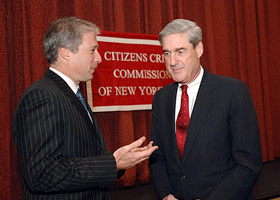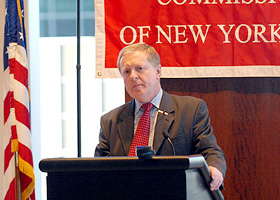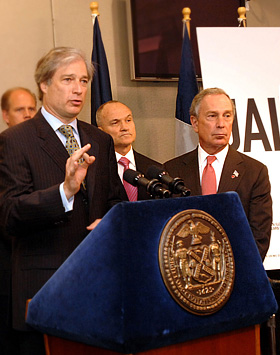
|
A non-partisan non-profit organization working to make criminal justice and public safety policies and practices more effective through innovation, research, and education. |
INITIATIVE Counter-Terrorism Strategies and Challenges Neither terrorism nor crime has any respect for municipal boundaries. To be effective today, the state, local and federal governments, military, law enforcement, and business sectors must overcome their traditional reluctance to share information beyond their own agencies to an unprecedented degree. Further, we must also look internationally for new ideas and solutions. To facilitate this exchange, the Crime Commission invites leading experts in the field of counter-terrorism to present on effective methods to combat terrorism and to explore the challenges they have encountered. The Crime Commission has hosted both local and international experts on counter-terrorism to discuss strategies and challenges including: FBI Director Robert S. Mueller III The Director's remarks discussed the growing danger posed by home-grown terrorism, the FBI's reorganization to respond to terrorist threats, and the importance of collaboration between local and federal law enforcement agencies. In the aftermath of September 11, Mueller noted, "There was no time to do a study. There was no time for broad contemplation. We had to work together quickly to engage the terrorist threat—here on U.S. soil, and abroad—and do so in new ways." read more » Raymond Kelly, Commissioner of New York Police Department Commissioner Kelly provided a wide-ranging overview of the current operations and new initiatives being taken to address the threat of terrorism at the NYPD. His department's strategies rely heavily on partnerships with national, state and local law enforcement agencies and the private sector; tactical deployment of officers; and utilizing technology, such as cameras and license plate readers. Sir Ian Blair, Commissioner of London's Metropolitan Police Sir Ian Blair discussed the bombings in London in July 2005 and his department's strategies for addressing the threat of terrorism, which include a major effort to engage with London's large Muslim population. "The only way that we are going to defeat terror is not just through intelligence agencies or police but through communities themselves feeling we can be trusted with information," he said. read more » Sir Jeremy Greenstock, formerly Britain's Ambassador to the United Nations and envoy to Iraq Sir Jeremy Greenstock discussed the trends in world politics which tend to feed terrorism and international crime. He was particularly focused on the growing threat posed by "ungoverned space," or geographic areas where governance has broken down, allowing terrorist groups and criminal organizations to thrive. "You will not eradicate terrorism, or these other sources of crime," Greenstock insists, "unless you persuade the populations where they had, that they must not tolerate these people in their society. That they must not tolerate violence within their society." read more » Sir Richard Dearlove, former head of Britain's Secret Intelligence Service Sir Richard Dearlove discussed recent developments in the global struggle against terrorism, tracing Al Qaeda's roots to periodic purification movements in the Muslim world and arguing that Western nations needed to adopt a more nuanced approach to the conflict. His suggestions include expanding Western intelligence capabilities and empowering moderates in the Middle East. "In short, I believe that in fighting or countering terrorism, we have lost clarity of purpose and execution," he observed. read more » Dr. John Reid, MP, Home Secretary of the United Kingdom Dr. Reid addressed the Crime Commission regarding his efforts as Britain's Home Secretary to address counter-terrorism and other crime-fighting issues. Two themes of interest to Reid were, first of all the conflict of values inherent in the struggle against terrorism, and second, the need for innovative public-sector efforts in this arena. "However you face this, through military security, policing, armed forces, intelligence, security agencies, let me make my position absolutely clear," Reid says. "At heart, this is a struggle for values." read more » The Crime Commission continues to facilitate the exchange of effective strategies to combat terrorism and the challenges encountered. |
|


